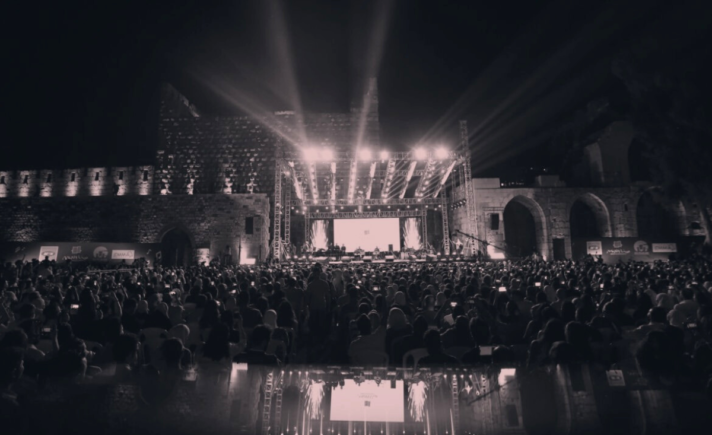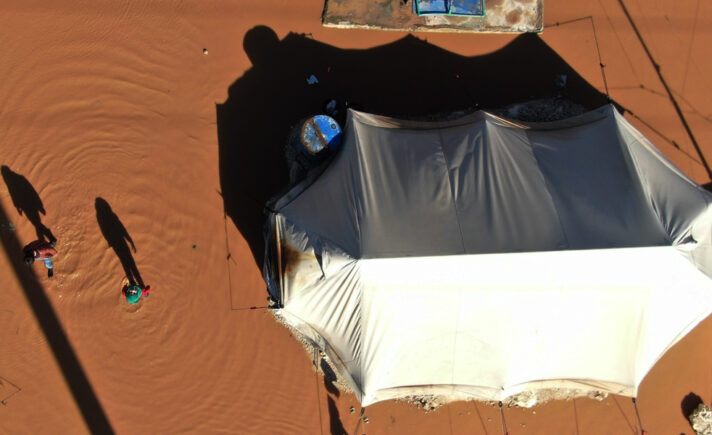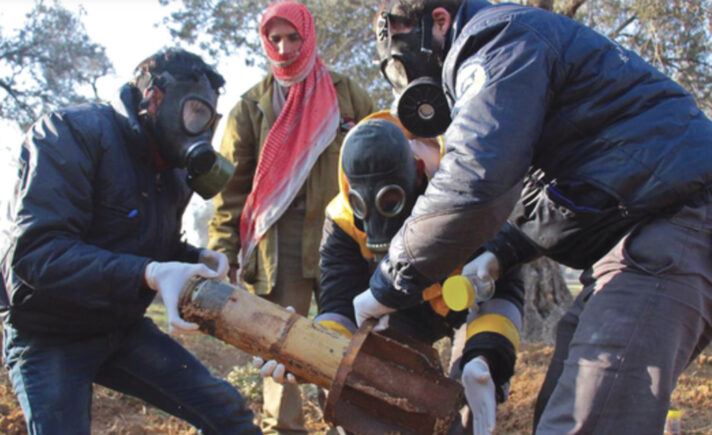[Editor’s note: All events, dates, and places mentioned in this text are real; the names used for people, however, are pseudonyms.]
Near the border strip separating the Syrian village of al-Rafid from the Israeli-occupied Golan Heights, refugees displaced from the towns and villages of southern Syria’s Daraa Province set up hundreds of tents in the summer of 2018. By the thousands, they were fleeing the Russian air bombardment that had intensified that June, when the Assad regime announced its intention to retake all parts of Daraa and neighboring Qunaitra Provinces still outside its control, and to “cleanse” them of “terrorists,” returning them to the “homeland’s embrace.”
Among these tents was a grey one bearing the United Nations logo on its roof and sides. It was in here that I would sit with five women brought together by friendship and displacement: Umm Muhannad; her daughters Ilham and Rawaa; their cousin Ghayda; and her relative Ibtisam. With the chaos of displacement combining with the summer heat to boil the blood in our heads, our stories to one another about our dreams and desires steadily warped to the point of near-delirium, in what may have been an unconscious effort to block out the madness surrounding us on all sides.
Waiting for the swings
Ribbons and balloons brighten up the scene; multicolored swing chairs revolve around a carousel; an amusement park, in short. “To spend just one day at an amusement park”—this was how Ilham summed up her dream to the women gathered in the tent.
Ilham was ten years old when she wore a blue dress with white and silver frills on the first day of Eid al-Fitr. She carried a small bag containing a variety of sweets, and some money gifted to her by her father for the Eid occasion, amounting to 300 Syrian pounds when she counted it. She would not, however, spend this money on the swing chairs, or on chips and other treats, as she’d hoped. That morning, her hometown, al-Hirak, began to be bombed from the air, and her father asked her to stay home until it stopped or subsided. Ilham waited three years, from the summer of 2012 to the summer of 2015, before being able to head to a patch of sand and gravel with swings that creaked at every move.
In the middle of this yard was a swing of a color very similar to that of Ilham’s blue dress. She sat her five-year-old nephew Ammar on it and made a promise to herself: “In two years, I’ll go to Daraa to sit the Junior High School exam, and then I’ll run off with my friends to ride the chair swings at last, away from the bombing, without waiting any longer.”
Yet when those two years were up, in the summer of 2017, it was a wedding dress that Ilham wore, not a school uniform, or Eid clothes. Her father asked for her “forgiveness.” As the leader of an armed faction, who feared she would be arrested if she went to sit the exam, he chose to marry her to their neighbors’ son, Khaled.
Something stronger than reproach was communicated by Ilham’s glare towards her mother as she recounted this. An unspoken quarrel took place between their eyes in the tent:
Your husband is responsible for making me pregnant before the age of 16.
He wanted to protect you, my child.
You should have forbidden him from taking up arms in the first place.
That would have been a betrayal of the revolution, Ilham.
Before this silent duel had a chance to turn vocal, when a single angry word from either one of them could set the entire tent and its inhabitants ablaze, Ibtisam let out a long “Oof,” cupped her chin in her palm, and said, “What a wretched generation yours is, Ilham, and how strange is your wish! Mine is yet stranger, though; I dream of putting my clothes in a closet.”
The closet’s curse
A closet contains everything owned by a household; the family’s memories and even their secrets lie between its drawers. Ibtisam hired the most skilled carpenter around to design a closet big enough to contain the world of her, her husband, and their son.
“Sturdy and tall, that’s how it was built,” she said. Then, in mourning: “The fire consumed everything. Everything. The closet resisted it, but to no avail.”
“First, they arrested my husband. Then they threw me and my son out, then turned their hatred on the house.” This was in early 2014, during a series of raids by regime security forces on the eastern half of the city of Nawa.
“When I returned to my house in March 2015, to sweep the dust off its floors, and off my heart, between its black walls, five or six boxes became my new closet,” said Ibtisam, leaning on a suitcase caked in dust by the journey. “What’s a house? Walls; a roof; a door that may or may not close. What’s the use, then, of Gypsum décor? In my mother’s kitchen, there were three aluminum cooking pots, which did many things: cook; heat water for bathing; poach or fry. So why was my mother’s cooking better than mine, when I use Tefal pots? They say the Tefal ones turn poisonous if their coating gets scratched. And the microwave causes cancer. Excuse me, it seems I’m babbling; to deal with things these days I’ve started stripping them of their characteristics. A container, for example, is something in which things are placed and stored. It makes no difference whether it’s wooden or metallic, circular or rectangular, so long as it serves its purpose.”
Ibtisam adjusts her posture. “Two months ago, I bought a closet said to be made of cheap and commercial wood. It didn’t matter. I kept it empty, and left the task of placing and storing my clothes to the boxes. The neighbors said I’d gone mad. It’s not madness, it’s a curse! Deep inside me, there’s a sense that the moment I put a piece of clothing in my new closet, the curse of the fire will return. Then again, it seems the curse was there from the day I bought my new closet, and the proof is that I’m here with you now, a refugee in a tent, with this bag serving the purpose of storing the clothes I was able to carry.”
Umm Muhannad curses the soul of the one who led the Syrian people as a whole to humiliation and indignity. Ibtisam stays quiet, wandering around a little. Then she points to Ghayda, whose face is covered in make-up, and says, “You, our pretty bride, give us yours.”
“At least, Auntie, you had clothes and a closet, and Ilham got to dance in a wedding dress.”
Married, but…
In the camps, it becomes easier to tell secrets and hold personal conversations than in other circumstances. Many of the camp’s women likely knew Ghayda was still a virgin despite being married. This was why they didn’t chastise her for going around in pink high-heels, dressing up elegantly with bright red lipstick when sitting on a rock or under the shade of a tree with her husband Mahmoud, the pair of them engulfed in a love still unconsummated.
“Just four days stood between me and wearing the wedding dress, swirling around in it among my friends,” said Ghayda. “But at exactly 11:05 on the morning of June 25th, 2018—a date I’ll never forget as long as I live—the sky filled up with rockets and fighter jets. This time was different from others before it; we had to leave our town, al-Hirak—that’s what my dad told Mahmoud over the phone. In half an hour or less, Mahmoud’s family’s van arrived. Piled on top of each other, our two families somehow managed to squeeze into the van. We drove to the town of al-Jiza, where we stayed for four days before leaving for Nawa, which we left in turn after two days, and here I am now sitting with you all. The clothes I was able to pack are only a small part of my full wedding outfit, which wasn’t hung up in a closet, or ‘placed and stored’ somewhere, in your words, Aunt Ibtisam. As for my wish…” Ghayda blushed and lowered her head, and said shyly, “You all know my wish.”
The women laughed, and Umm Muhannad said, “You have every right to wish it.” Then Ilham asked Ghayda, “What do you say we leave the tent today for you and Mahmoud?” “No, that would be embarrassing,” replied Ghayda. “Not at all!” shot back Ibtisam. “In displacement, everything is permitted.”
“What about me? I want a day for me and my husband!” said Rawaa indignantly, averting her gaze from her mother, who shot her a look of stern surprise. “Do you know I’ve been married almost eight years, and can count on one hand the number of times I’ve slept with my husband? Thank God one of those times got me pregnant.”
Rawaa got married on March 4th, 2011, and lived in her own room in her in-laws’ house in the city of Daraa. Fifteen days later, her husband joined the army in Homs. When her husband’s family opened their doors to receive her family on March 20th, they found the latter with stunned looks on their faces, as dozens of men marched through the streets behind them, chanting, “Freedom, freedom!”
“The period between the end of March and the end of May 2011in Daraa was when the army besieged the Old Town, and regime security forces fired live rounds on unarmed demonstrators,” recalled Rawaa. “And it was at this same time that I fell to the ground, my head spinning, and learned I was expecting. I became pregnant in April, during the week my husband spent with us. At that time, his father forbade him from leaving the house and joining the protests, ordering him to return to the army and not leave it until things stabilized. Things didn’t stabilize; they grew worse; and we were separated. My husband’s family went to the town of Izraa, and I went back to my family’s house in al-Hirak in late 2011. My husband stayed in Homs. We would write to each other on WhatsApp, until suddenly I lost contact with him for five months.”
Rawaa drew in a deep breath. “I had more or less convinced myself I was going to be a young widow with a baby, until at last my husband appeared at my family’s door, disheveled and broken. He swore he’d never go back to Homs, and indeed he never did, but he didn’t come back to me either. He disappeared with a faction of the Free Syrian Army until a grave leg injury in late 2013 sent him to Jordan, where he stayed for six months. When he returned, we lived together—me, him, and our son, with my parents, my sister Ilham, my two little brothers, and my eldest brother Muhannad—all in one house. It wasn’t much different to living with my in-laws, except that my husband felt embarrassed, as though he were a burden on my father. To get over this feeling, he found a job in 2016, and with great help from family and friends, we began building a small house on a piece of land we bought near my family’s home. I dreamed of painting it white, and wandering around inside it in a sheer dress. What a beautiful dream—and what a foul reality, in which I wake up not to the keys of the near-finished house but to a rocket shattering it, robbing me of my dream and sending me to you, to ask you…” Rawaa laughed, and then continued, “To ask you to leave the tent, my darlings.”
We laughed along with Rawaa, not with mirth, but because “the worst misfortunes bring laughter,” as the proverb quoted by Umm Muhannad goes. The latter dusted herself off and said, “I swear to God, your dreams are a misery just like my heart.” Rawaa joked back: “Don’t worry Umm Muhannad, we’ll add your name to the tent evacuation list.”
“Shut up! I don’t want evacuation or anything else, I just want to take a shower and get this filth off my body. I haven’t showered in two weeks!” She then made to get up, and told me, “Why don’t we go sit under some tree, by God I’m sick of this heat.” I nodded my head in assent. I also wanted to get away, not from the pitiless heat, but from Ibtisam and Ghayda’s insistence that I talk about my dream. My dream of riding a motorcycle on the so-called “war route” connecting the eastern and western halves of Daraa Province seemed too small and paltry to be worth discussing, while at the same time far too ambitious to ever be attained.
UNHCR
Umm Muhannad’s two small children stood next to the grey tent emblazoned with the United Nations logo. Pointing to the blue text, one asked the other: “What does this mean?”
“You idiot, it’s translated into Arabic just underneath,” the other replied. Together, they started reading the words: The United Nations High Commissioner for Refugees.
This same UNHCR announced that the number of new refugees in southern Syria as a result of the 2018 military campaign exceeded 270,000; a humanitarian catastrophe it condemned. It then closed its statistical folders, and its condemnations drowned in the Mediterranean before managing to reach the UN’s offices in Geneva.
On the bright side, though, the women’s dreams may one day become material written about by the UN Human Rights Committee.
None of us knows what happened to our grey tent. Ghayda and her husband returned to al-Hirak when it entered into a “reconciliation” deal with the regime and the Russians. Ilham opted to go to Damascus with her husband, after he received a promise from a senior regime officer to sort out his security and legal situation. Ibtisam left the camp with her child to go to Nawa and sign “reconciliation” papers, still hoping her husband would return from detention one day.
I stayed with Umm Muhannad and Rawaa in the tent, until we left it one night in late July 2018, traveling with hundreds of other refugees from the camp to the village of al-Qahtaniyah in Qunaitra Province, whence the convoys of the next round of displacement would depart for the north.
[Editor’s note: This article was originally published in Arabic on 5 February, 2019]





